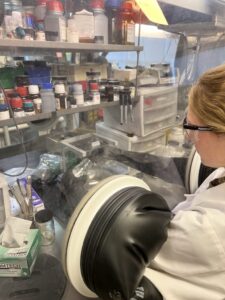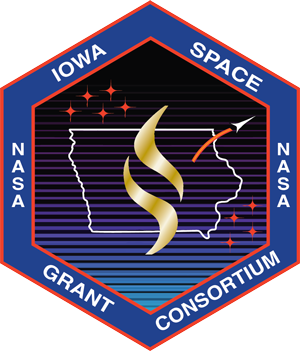 Batteries are constantly developing as our society advances. Studies show that solid-state electrolytes have numerous benefits compared to the typical liquid electrolyte. More specifically, glassy solid-state electrolytes are a strong contender because they have lower processing temperatures, are less likely to form dendrites, and have greater chemical flexibility. Glassy solid-state electrolytes are also safer because they are less flammable, can store a greater amount of energy, have a longer life cycle, and can be made smaller than an average battery. The main issue with glassy solid-state electrolytes is their inability to retain good contact between both ends of the battery due to their thickness. To combat this, the glass needs to be drawn into a thin film so it can have a comparable amount of contact to a liquid electrolyte. I am helping to create different kinds of lithium-based glasses that are extensively tested using differential scanning calorimetry (DSC), Raman spectroscopy, Fourier-transform infrared spectroscopy (FTIR), and Electrochemical impedance spectroscopy (EIS). These tests allow us to become closer to finding the best possible chemistry for glassy solid-state electrolytes.
Batteries are constantly developing as our society advances. Studies show that solid-state electrolytes have numerous benefits compared to the typical liquid electrolyte. More specifically, glassy solid-state electrolytes are a strong contender because they have lower processing temperatures, are less likely to form dendrites, and have greater chemical flexibility. Glassy solid-state electrolytes are also safer because they are less flammable, can store a greater amount of energy, have a longer life cycle, and can be made smaller than an average battery. The main issue with glassy solid-state electrolytes is their inability to retain good contact between both ends of the battery due to their thickness. To combat this, the glass needs to be drawn into a thin film so it can have a comparable amount of contact to a liquid electrolyte. I am helping to create different kinds of lithium-based glasses that are extensively tested using differential scanning calorimetry (DSC), Raman spectroscopy, Fourier-transform infrared spectroscopy (FTIR), and Electrochemical impedance spectroscopy (EIS). These tests allow us to become closer to finding the best possible chemistry for glassy solid-state electrolytes.
Hannah Cochran – Iowa State University
Student: Hannah Cochran, Undergraduate Student in Materials Engineering, Iowa State University
Research Mentor: Steve W. Martin

MISSFIT – Artificial Gravity Model for Interplanetary Space Travel
2023-2024, Undergraduate
